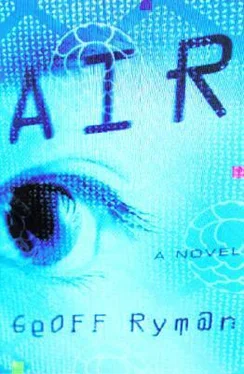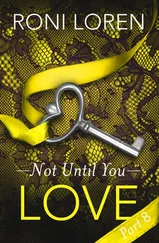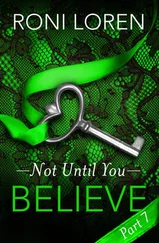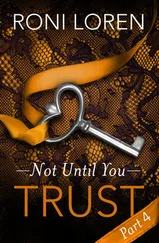'Did you know Mr Tunch when he was a boy?' she asked.
Nothing in his face moved. He watched her eat and took back the plate and the knives.
Mae saw the tiny blinking red light that watched her. She waited until all the lights were off and they could not see her. She whispered to herself without even moving her lips. 'Mae Mae Mae Mae Mae…'
She traced the gnarled root of herself back down deep. She felt the settling peace, the calm, and the end of fear and terror. As she fell away from it, the white walls of Yeshiboz Sistemlar looked as thin and frail as eggshells.
Mae settled as gently as an angel into the courtyard. Her clothes seemed to trail after her in ribbons, like silk underwater. The courtyard now looked more like Kwan's grand house. Instead of pens, the blue walls were lined with beautiful new businesses all glowing golden with light. They had modern plastic shop-signs that looked like poppies opening and closing, info… help… that's entertainment…
Mae entered help, and there was Mae herself, dressed as a Talent. Assistant-Mae knew what she wanted. She wanted to see the Gates Format for herself. 'I am afraid there is no programming that allows communication between the UN and the Gates Formats. You will not be able to find any Gates Format imprints.'
Mae asked the mask, 'Does this system contain any information about the Gates Format?'
Mae-assistant smiled like a shop sign. 'The "Help" function contains information about functions in this Format only.'
'Is there anything in "Info"?'
I want to know what imprints are and how they work. I want to know what the UN Format is and how it translates thoughts. I don't want to owe Tunch for anything.
The assistant-Mae replied smoothly: 'The "Info" section was developed for the pilot project and contains only examples of proposed kinds of content.'
Mae regarded her own face. Is my smile so unhelpful when I turn it on my customers? 'Why doesn't Air contain anything?'
Was the smile more broad? 'It is a common failing of IT projects to underestimate the difficulty of providing content and the time scales required.'
Air was pig-ignorant. Mae was not fooled, either, by her own face. These things – the courtyard, the shop fronts – they are just for show, this is not Air itself, they are the traffic signs towards it.
So Mae turned without another word and walked into Air. Air, she knew, was eternal. Mae walked, deliberately this time, into the blue of information.
She merged with the blue walls, as if they were glowing blue fog. She kept on walking. The walls faded into night. She stood in chaos, and kept feeling the gnarled root, deeper and deeper until even the sound of her own thinking was hushed and she felt even herself fade.
The root seemed to get thicker and thicker, as if it had become the trunk of a tree. It would eventually become Everything. It would become the world; and all the worlds in which the world sat. Mae herself was the thinnest possible little trail back towards the fiction of the world.
She could no longer remember what she was looking for.
I don't want to go on, she managed to think.
Blindly she felt her way back. The blue light shone, her fingernails glowed as white as her hospital gown as if everything were smiling.
Mae stepped back into the courtyard. She walked quietly into That's Entertainment. There were games machines, and radios all along the walls. There was soaring operatic music. In front of a TV set, Old Mrs Tung sat watching Turandot.
'Hello, Granny,' said Mae gently.
Mrs Tung turned and smiled, eyes twinkling. She could not remember the last time she and Mae met. All she remembered was the love, deeply imprinted.
There you are, dear. I was just thinking, I hope Mae comes to pay a visit. Isn't it marvellous, the TV? How I've yearned to see Turandot. They say it happens in Karzistan, you know.
And you have seen it over and over and over, because it is the only thing on TV in Air. But you can't remember that. Heaven is the place where you cannot change and nothing can ever happen, so the things you love are always eternal. Hell is exactly the same.
The hero Kalaf was singing. 'No one's sleeping. No one's sleeping.'
'I just wanted to make sure,' said Mae. 'I just wanted to make sure that you were well. I just wanted to make sure that you were as beautiful as I remember.'
Oh-hoo-hoo. The hooting laugh. Now eternal.
And Old Mrs Tung reached across and took Mae's hand. Mrs Tung thought she still had a hand. Is the beaning going well this year: I used to so love it. All of us on blankets doing the shelling together.
'Yes,' said Mae. 'It is still going well.'
Then Mae said, though she knew Mrs Tung could not understand: 'I know it is not you who does these things to me. It is the error they made, whatever mistake it was. I just wanted to make sure of that.'
And Old Mrs Tung hooted again, as if she knew what Mae was talking about.
And Mae began to repeat her own name over and over. Her and Mrs Tung's metaphorical hands disentangled like roots.
In the morning, the guard served Mae breakfast on a tray.
The food iridesced like a rainbow, and the flavours veered between pork and jam and all the flavours of breakfast at once. It was delicious. She threw it up into the wastebasket. It continued to shift colours in the bin.
Mae covered her eyes and wept, and then cast off the water from her cheeks. She was led out through all the Disney World people, all spanking new and polished. Do you know they keep prisoners here? she asked their pristine smiles. She was led to the desk. Time, she told herself, to learn.
The desk began by showing her the inside of an eye. Early efforts at interface had beamed coded light signals onto the retina and recorded differences in pathways. Residual patterns of neural activity appeared that were nothing to do with the light. Other information appeared to be passed.
The brain was responding to low levels of electrical charges from outside the body.
Animals were given sudden peak charges that stimulated all areas of their brain. Every neural pathway was stimulated at once. The mystery was that, once stimulated, the charge continued. The brain entered a new state, always charged, always open. The charge continued to exist without any further source of energy.
How could this be? There could be no perpetual motion, no undying source of unreplenished energy.
Unless the brain existed in a realm with no time. Once imprinted, it stayed charged. It was like a radio switched on forever, but not in our world.
There was another world, of seven other dimensions beyond time, and Air existed in those. Air had no spatial dimension. In Air, one mind occupied the same space as another. Stimulation of one imprinted brain correlated to increased activity in another.
But attempts at shared thinking resulted in disorder and discomfort. One brain works in a way very different from another.
What was needed to make Air work was a uniform Format for information.
In theory at least, this Format would simply be information, too. It could be added to the imprints, providing a shared mechanism for making messages compatible and so able to be shared.
The first Formats were crude mathematical formulae that made only the simplest kinds of neural impulses to be communicated.
The first successfully shared Air message was '2 plus 2 equals 4.' It took the form of nervous jolts: two jolts, two jolts, and then four in succession.
If Air were to be used for any commercial purpose, it would have to do more than that.
Synaesthesia was a phenomenon long known and little understood. Some people saw sound, tasted colour, felt words in their fingertips. The brain, so delicate, so responsive, was responding to minute charge differences caused by other phenomena. Infants experienced them – then learned how to block them.
Читать дальше












